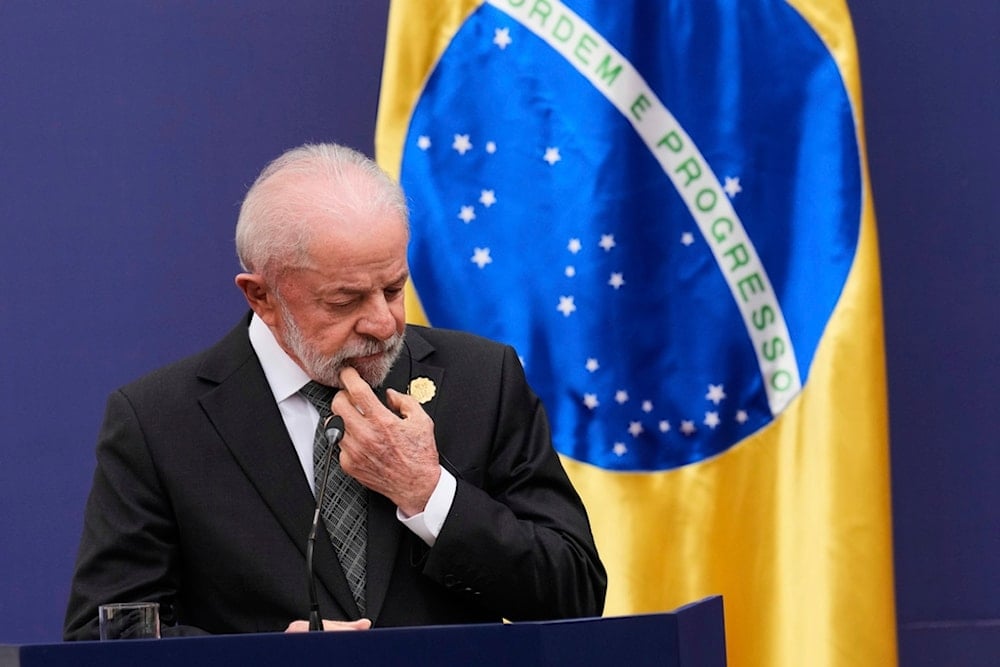Brazil to join South Africa ICJ genocide case against 'Israel'
Brazil will join South Africa’s genocide case against "Israel" at the ICJ, adding to growing international pressure over the Gaza war and alleged war crimes.
-

Brazil's President Luiz Inacio Lula da Silva gives a statement during a forum on democracy and multilateralism at La Moneda palace in Santiago, Chile, Monday, July 21, 2025. (AP)
Brazil will formally request to intervene in South Africa’s genocide case against the Israeli occupation over its actions in Gaza, a source familiar with the matter told Reuters on Wednesday.
The move signals growing international support for South Africa’s legal challenge at the International Court of Justice (ICJ), which alleges that the Israeli regime has violated its obligations under the 1948 Genocide Convention through its ongoing military campaign in the Gaza Strip.
South Africa filed the case in December 2023, urging the court to rule that the Israeli occupation’s actions, under the pretext of targeting the Palestinian Resistance group Hamas, amount to genocide against the Palestinian population in Gaza. The ICJ has since held several hearings and issued provisional measures ordering "Israel" to prevent acts of genocide and ensure humanitarian access to the besieged territory.
Brazil now joins a growing list of countries, including Spain, Turkey, and Colombia, that have submitted formal requests to intervene in the proceedings. Under ICJ rules, third-party states can intervene in cases concerning multilateral treaties such as the Genocide Convention, allowing them to present their own legal interpretations and arguments.
Brazilian President Luiz Inácio Lula da Silva has been an outspoken critic of the Israeli war on Gaza, describing the humanitarian toll as “unacceptable” and accusing the occupation of violating international law. The Brazilian government has repeatedly called for an immediate ceasefire and full accountability for war crimes.
ICJ conducts hearing on Gaza starvation
Back in May, the International Court of Justice (ICJ) concluded a week of hearings on Friday to determine what legal obligations "Israel" holds in ensuring the delivery of urgently needed humanitarian aid to Palestinians in Gaza and the occupied West Bank, reported the Associated Press (AP) on Friday.
The case, brought before the court following a request by the United Nations General Assembly, addresses "Israel’s" ban on the United Nations Relief and Works Agency (UNRWA), the primary aid provider in Gaza.
According to AP, the hearings come as the humanitarian system in Gaza teeters on the brink of collapse, with "Israel" having blocked the entry of food, medicine, fuel, and other essential supplies since March 2.
A renewed military offensive launched on March 18 broke a brief ceasefire, and large parts of Gaza have since been seized under the pretext of pressuring Hamas to release the captives. Although "Israel" declined to participate in the hearings, it submitted a 38-page written statement for the court’s consideration.
'Israel' blocks lifesaving aid
The AP report stressed that the focus of the hearings was the legal requirement for states to enable the unhindered provision of humanitarian assistance, adding that the case follows "Israel’s" January ban on UNRWA operations in Gaza.
In turn, Prime Minister Benjamin Netanyahu and members of his far-right coalition claim the agency is infiltrated by Hamas, an accusation UNRWA has rejected.
Experts say the ban has crippled relief efforts in Gaza, where the population faces acute shortages and where international agencies have warned of an impending famine. "This advisory opinion is a very important opportunity to reinforce that states cannot pick and choose where the UN is allowed to operate," said Mike Becker, a human rights law expert at Trinity College Dublin.
While the ICJ’s advisory opinions are considered "nonbinding," they carry significant legal and diplomatic weight, arguing that the treaty governing protections for UN personnel stipulates that such disputes should be resolved through the ICJ and that the court’s opinion "shall be accepted as decisive by the parties."

 4 Min Read
4 Min Read








